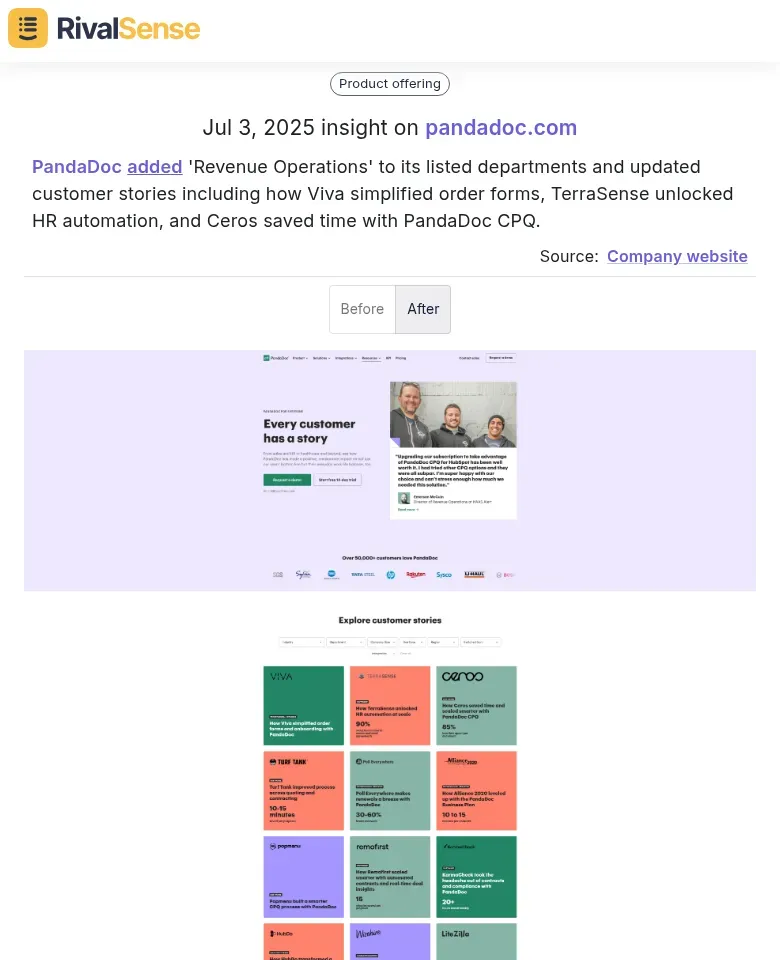How PandaDoc's Revenue Ops Shift Can Transform Your Competitive Strategy
Before PandaDoc's strategic revenue operations shift, the company operated in a highly competitive document automation arena dominated by players like DocuSign and Adobe Sign. Despite innovative features, PandaDoc struggled with operational scalability and cross-team alignment, which hindered revenue growth potential. Competitors were aggressively adopting AI-driven personalization and integrated solutions, creating market pressure that demanded strategic adaptation.
Key challenges PandaDoc faced included:
- ⚡ Fragmented data systems: Disconnected tools created inefficiencies
- 🔄 Customer retention struggles: Competitors offered more tailored solutions
- 🌐 Market saturation: New entrants intensified price competition
Initial competitor strategies revealed critical patterns:
- 🎯 Hyper-personalization through advanced analytics
- 🔌 Seamless CRM integrations as a market differentiator
- 💰 Aggressive pricing models to capture market share
Practical Advice for Immediate Action
- 🛠️ Conduct a tech stack audit to eliminate data silos
- 📊 Implement analytics tools for customer behavior insights
- 👀 Establish competitor monitoring for pricing/feature changes
- 🤝 Develop retention programs with value-added services
The Catalyst: Identifying the Need for Change
PandaDoc's revenue operations pivot emerged from clear signals in customer feedback and market trends. Analysis revealed growing demand for personalized document management solutions that competitors were already addressing through AI adoption. This recognition of evolving customer expectations and competitive gaps became the catalyst for transformative change.
Competitive intelligence proved pivotal in this realization. For example, RivalSense detected that PandaDoc added 'Revenue Operations' to its listed departments and updated customer stories including how Viva simplified order forms, TerraSense unlocked HR automation, and Ceros saved time with PandaDoc CPQ.

Tracking organizational changes like department additions reveals strategic pivots before public announcements, allowing competitors to anticipate market shifts.
Actionable Steps for Strategic Pivots
| Step | Action | Outcome |
|---|---|---|
| 1️⃣ | Analyze customer feedback cycles | Identify unmet needs |
| 2️⃣ | Monitor market trend reports | Spot emerging opportunities |
| 3️⃣ | Track competitor movements | Discover differentiation gaps |
| 4️⃣ | Conduct gap analysis | Prioritize innovation areas |
| 5️⃣ | Map opportunity landscapes | Uncover untapped markets |
The Strategy: Implementing the Revenue Ops Shift
PandaDoc's RevOps transformation unified sales, marketing, and customer success through integrated technology and aligned objectives. By leveraging CRM tools and AI analytics, they created seamless data flow across departments. This operational cohesion directly addressed competitor weaknesses in customer journey fragmentation while establishing new market positioning.
The implementation followed a disciplined approach:
- Comprehensive competitive analysis to identify service gaps
- Cross-functional KPI alignment for shared objectives
- Strategic technology investments in scalable platforms
RevOps Implementation Checklist
- ✅ Audit departmental silos and workflow bottlenecks
- ✅ Define RevOps objectives tied to market opportunities
- ✅ Select integration-friendly technology solutions
- ✅ Develop collaborative workflow training programs
Pro Tip: Start with pilot projects to measure impact before full implementation, and continuously monitor competitor counter-moves.
The Impact: Measurable Outcomes and Competitive Gains
PandaDoc's RevOps shift delivered substantial business results while reshaping competitive dynamics. Within the first year, they achieved a 30% revenue growth increase and 25% higher customer acquisition rates. Beyond financial metrics, customer satisfaction scores rose significantly through personalized engagement and streamlined processes.
The strategic impact unfolded across timelines:
- ⏱️ Short-term: Accelerated response to market demands
- 📈 Long-term: Established category leadership position
- 🔄 Competitive: Forced rivals to rethink operational models
Competitive Response Framework
- 🔍 Conduct revenue operations bottleneck analysis
- 📈 Implement data-driven personalization systems
- 🤝 Create cross-departmental collaboration protocols
- 🚨 Monitor industry shifts through competitive intelligence
- 🔄 Establish continuous improvement feedback loops
Lessons Learned: Insights for B2B Companies
PandaDoc's transformation provides actionable insights for B2B companies considering similar strategic pivots. The journey revealed that success hinges on early cross-functional alignment and converting data insights into operational decisions. Several critical lessons emerged that can shortcut implementation timelines for others.
Key pitfalls to avoid include:
- ⚠️ Over-engineering processes that reduce agility
- ⚠️ Inadequate training on new systems/workflows
- ⚠️ Sporadic competitor monitoring creating blindspots
Implementation Best Practices
- 🎯 Team Alignment: Conduct monthly cross-departmental strategy sessions
- 📊 Data Utilization: Implement real-time dashboard reporting
- 🔍 Competitive Monitoring: Establish automated tracking of key competitors
- 🔄 Agility Maintenance: Quarterly strategy reviews with adjustment mechanisms
Conclusion: The Future of Competitive Strategy in Revenue Ops
PandaDoc's RevOps transformation demonstrates how integrated operations become competitive advantages in evolving markets. The convergence of data analytics, cross-functional alignment, and competitive intelligence represents the new operational paradigm. As this approach becomes standardized, differentiation will increasingly come from execution speed and predictive capabilities.
Emerging competitive strategies will focus on:
- 🔮 Predictive analytics for customer behavior
- 🤖 AI-driven personalization at scale
- 📡 Proactive market shift anticipation
Strategic Preparation Checklist
- 🛠️ Audit current technology gaps
- 🔗 Implement integrated data systems
- 👁️ Establish competitor monitoring
- 🎓 Develop analytics skill training
- 🔄 Create continuous improvement cycles
Ready to transform your competitive strategy?
Try RivalSense for free and get your first competitor report today. Track product launches, pricing changes, leadership moves, and market shifts—all delivered in actionable weekly insights.
📚 Read more
👉 Facebook Insights: Real-World Competitive Intelligence for B2B Leaders
👉 AI-Powered Insights: Transforming HR & Finance Competitor Analysis
👉 Decoding Market Entry: How Digital Rivals Are Transforming Strategies
👉 Decoding Competitor Moves: How to Respond When Rivals Launch New Products
👉 Strategic Competitive Tracking: The Ultimate Guide for Business Leaders
